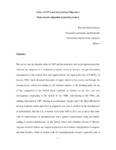
Please use this identifier to cite or link to this item:
http://ricaxcan.uaz.edu.mx/jspui/handle/20.500.11845/165| Title: | Crisis, NAFTA, and International Migration From Massive Migration to Growing Repatriation |
| Authors: | García Zamora, Rodolfo |
| Issue Date: | 30-Jan-2015 |
| Publisher: | Taylor & Francis |
| Abstract: | This article argues that the change of the economic model, accompanied by the economic and financial reforms, were the impetus for a transformation in the structure of employment and in particular of a new phase in migratory patterns. In the first part we offer a brief overview of the key debates from those years regarding migratory and productive tendencies that resulted from the NAFTA agreement. Then it analyzes the specific explanations given for the massive migration of Mexicans during the first years of NAFTA. To conclude, it examines the principal migratory tendencies in this century that relate directly to the regional economic dynamic, the economic crisis and the trends in the massive return of Mexican migrants. The economic crisis in the USA, from 2007 to 2013, brought that effect to an end, and the resulting rise in unemployment coupled with greater border militarization — including mass deportations — in this period resulted in greater numbers of forced and voluntary returns of Mexican migrants in the absence of any government support program for the economic reintegration of those migrants and their families, a context in which —coupled with the issue of un/employment— represented one of the most significant short- and long-term challenges for the nation. |
| URI: | http://hdl.handle.net/20.500.11845/165 https://doi.org/10.48779/0j6e-y188 |
| ISSN: | 0891-1916 |
| Other Identifiers: | info:eu-repo/semantics/publishedVersion |
| Appears in Collections: | *Documentos Académicos*-- UA Estudios del Desarrollo |
Files in This Item:
| File | Description | Size | Format | |
|---|---|---|---|---|
| García, Rodolfo. Crisis, NAFTA and International Migration.pdf | Versión pre-print | 341,55 kB | Adobe PDF |  View/Open |
This item is licensed under a Creative Commons License
